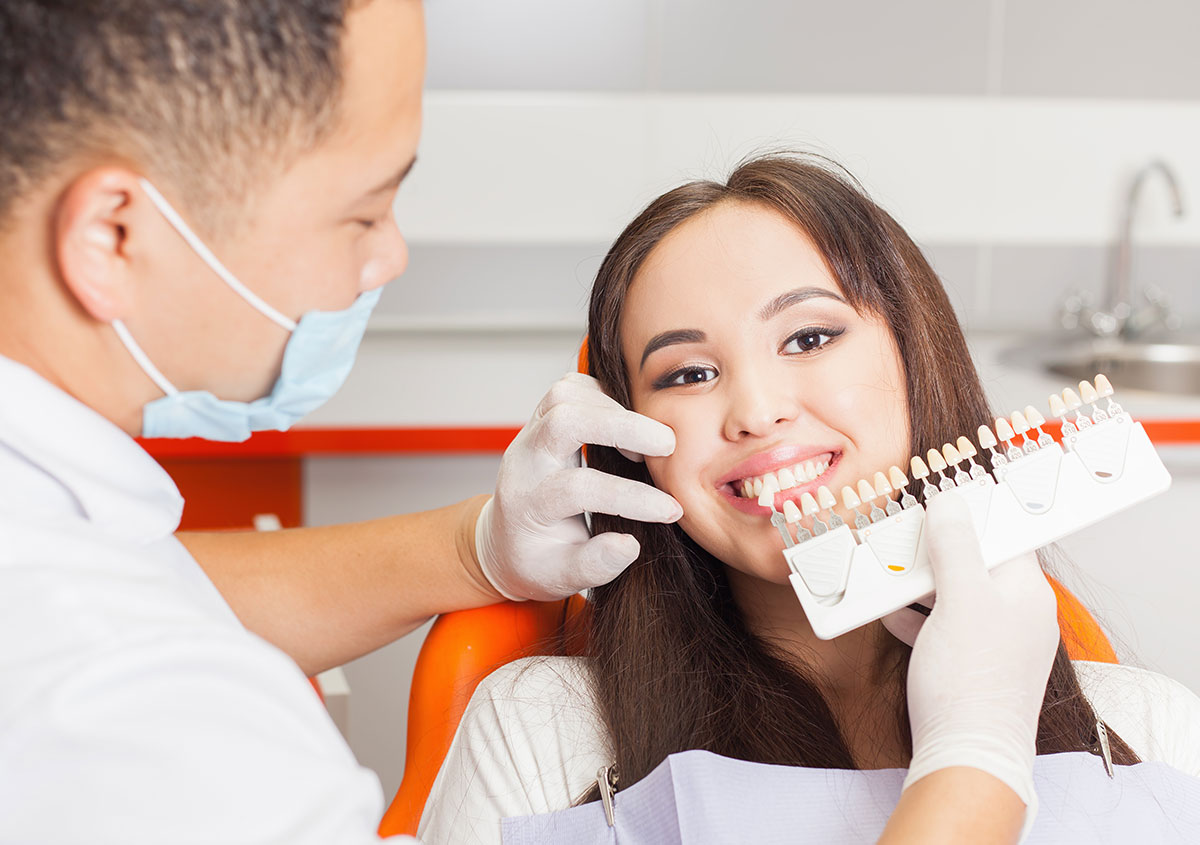Porcelain Crowns: Pros and Cons, Proper Maintenance
Basically, there are three types of dental crowns, all designed to replace badly decayed or damaged natural teeth. Dentists recommend crowns in order to save the tooth’s existing root, to minimize the expense of restorative work and, in many cases, to improve appearance.

Essentially, there are three types of crown: Porcelain, metal, and porcelain-clad metal. Each has some advantages and drawbacks.
Pros of Porcelain Crowns
Can Be Formed to a Natural Shape
Porcelain, actually a type of ceramic used to create a “jacket” for the visible portion of tooth structure, can be formed to the shape of the natural tooth, and is an aesthetically pleasing and time-efficient way to restore the beauty and function of damaged teeth. It is often recommended for prominent front teeth, but porcelain crowns can also be appropriate for larger molars.
Nearly Impossible to Distinguish from Natural Teeth
Often it is nearly impossible to distinguish any difference between a porcelain crown and a natural tooth. The material can be made to closely mimic the tone and translucence of dental ivory. This is important for anyone who is concerned about appearance. It can be tinted to any shade, boasts a smooth surface and will retain its luster.
Bio-Compatible Material
Porcelain is termed a bio-compatible material, meaning that it will not cause allergic reactions and will not cause gum irritation. Once a porcelain crown is fitted and properly installed in the mouth, it looks and feels as if it belongs there. Porcelain crowns are singular: the material is exactly the same throughout its entire surface, and the crown itself extends into the gum line, adding to the illusion that it is natural.
Disadvantages of Porcelain Crowns
As attractive as they are, there are some negatives associated with porcelain crowns. The foremost concern may be the price. For highly visible front teeth, however, where appearance is all-important to a pleasing smile and self-image, there is no better choice.
However, there are some minuses associated with porcelain:
Porcelain can be Fragile
Porcelain can be fragile, is subject to shocks and can be chipped or cracked by hard chewing and biting. For front teeth, porcelain may represent a kind of “good news bad news” scenario. While they look good, porcelain crowns can require more care; mouth guards are recommended for anyone who plays sports, and anyone with a porcelain crown should exercise some caution when biting into some kinds of food.
More of the Original Tooth is Ground Away
In order to ensure that the crown is strong and durable, more of the original tooth structure is often ground away to make the porcelain as thick as possible. The crown itself has more mass, but the extra bulk and exacting preparation also require additional precision, and porcelain crowns are typically more expensive than other types.
Can Increase Sensitivity to Hot or Cold
Similarly, because more of the original tooth structure is removed, the result can be increased sensitivity to hot and cold. Hypersensitivity is painful, and temperature extremes sometimes lead to damage of the crown and subsequent tooth damage as well.
Proper and exacting fitting is absolutely necessary, but with a trusted and experienced dental professional, this should not be a concern.
Other Types of Crowns
Porcelain Veneer Crown
For hardworking molars, and for less prominent teeth, a practical and attractive alternative to full porcelain or full metal is the porcelain veneer crown. This hybrid actually has the advantage of both strength and good looks.
Essentially, a crown of metal with a fused porcelain surface will appear to be “normal” in most ways. Upon close examination, the metallic structure of the crown might be apparent, a thin line of metal may be visible at the gumline and, over time, the hue of porcelain might change slightly in character. Occasionally, the ceramic will chip or break off the surface. However, these should not represent a major problem for any tooth that is not in the “front line,” so to speak.
Metal Crowns
Metal crowns also have a place in modern dentistry. Today, prefabricated stainless steel crowns are most often used as temporary measures for both children and adults. Other metals, including alloys of gold and silver, or of cobalt-chromium and nickel-chromium, are strong and long-lasting, but they are also not pretty. There are used most often for rear molars that are only minimally visible.
Resins
Resins are also sometimes used for crowns, and although they may be less expensive than other types, they are more prone to stress and wear than other materials.
Porcelain veneer is exactly what it sounds like. A thin layer of porcelain is applied to a tooth’s surface, usually to enhance appearance, to close gaps between teeth or to balance one or more misaligned teeth. It is a newer procedure that does not involve a crown, but may be used in conjunction with crowns to correct deficiencies and improve strength and performance of the teeth. Porcelain veneers require the same level of skill and attention to detail as crowns and other types of restorative and cosmetic dentistry.
How to Care for Porcelain Crowns
Caring for a crown does not require any additional effort. Once bonded to the existing tooth structure, the crown itself will look, feel and act just like any other tooth in the mouth. Proper care involves only brushing, flossing, periodic cleaning by a dental hygienist and and twice-yearly checkups by your dentist, the procedures we at Briglia Dental Group recommend to any patient.
Of course, as with any other tooth in your mouth, it is important to report any pain or discomfort to your dentist. The probability that a crown will chip or crack is slight, but any concerns about the crown should prompt a call to the dentist.
Practice Good Oral Hygiene
Common sense oral habits apply not only to crowns — of porcelain or other materials — but also to an entire mouth full of natural teeth.
- Only use your teeth for biting into and chewing food; they are not meant to be a “tool” for any other use.
- Try not to grind your teeth; if you have a nighttime tooth-grinding situation, take remedial steps, such as wearing a tooth guard.
- Do not chew ice, and avoid biting into and chewing hard foods as much as possible, especially if you have a delicate porcelain crown on one or more front teeth.
Respect Your Investment!
Finally, respect the investment you have made in your teeth and your smile. The importance of proper oral hygiene cannot be overestimated. If you have any questions about the health of your mouth, gums and teeth, feel free to call us at (610) 615 0160 to discuss your concerns.
At Briglia, we are concerned about your well-being, and we’ll do everything possible to improve your health and help you find your own best way to beautiful teeth and a lasting smile.
Share this Article
Back to Blog Page





